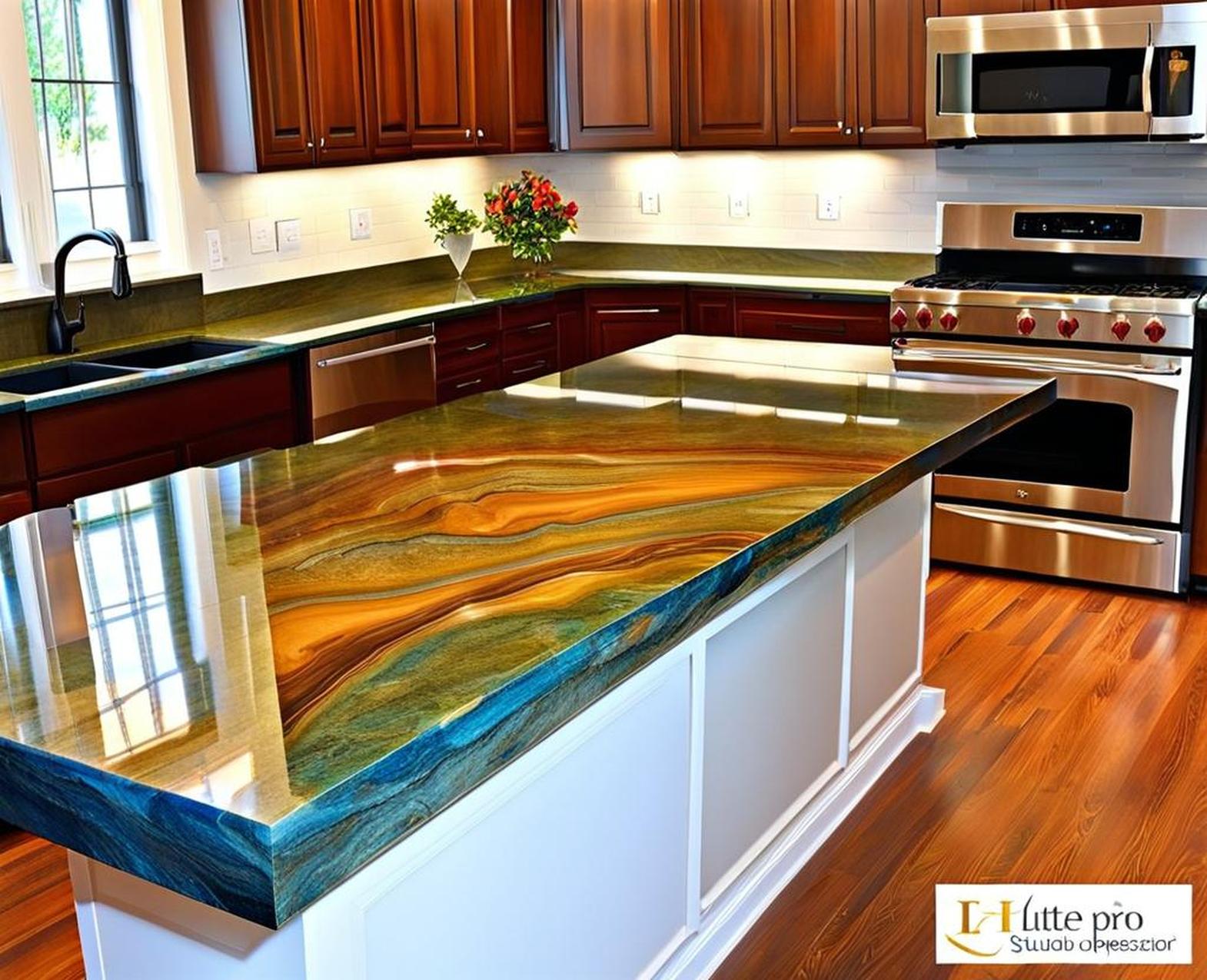Epoxy countertops have surged in popularity over the past few years. Homeowners and contractors alike are drawn to epoxy’s smooth, glass-like finish and reputation for durability. But a common question arises: what is the actual lifespan of an epoxy countertop? How many years of beauty and function can you realistically expect it to provide before needing a refresh?
You’ll learn how factors like installation, maintenance, and environmental conditions impact lifespan. We’ll also cover signs to watch for when it’s time to consider resurfacing. Read on to get the facts on realistically how long your investment in epoxy countertops will last.
What Are Epoxy Countertops?
First, let’s start with a quick primer on what defines an epoxy countertop. Epoxy refers to the resin material used to create the countertop surface. The liquid resin is poured over the base substrate and self-levels to create a smooth, durable finish. Key traits of epoxy countertops include:

- Glossy, glass-like surface
- Moisture, stain, and scratch resistant
- Can be poured over existing countertops or new bases
Epoxy countertops are commonly seen in home kitchens and bathrooms, but also work well for garages, basements, labs, and more. When properly installed, they are highly functional while adding an decorative dimension to any space.
Expected Lifespan of an Epoxy Countertop
So when discussing “how long do epoxy countertops last,” what timeline can you reasonably count on? With proper installation and care, the average expected lifespan of an epoxy countertop is 10 to 15 years or longer . Some sources cite epoxy countertop lifespans in excess of 20 years, especially when using higher-end epoxy products.
| Average Lifespan | 10 to 15+ years |
| With Premium Epoxy | 15 to 20+ years |
Over an extended period, you can expect the glossy finish to gradually fade. But the countertop remains functional. With proper care and maintenance, your epoxy countertop should provide beauty and utility for over a decade before needing refinishing.
Factors That Impact Epoxy Countertop Lifespan
A variety of factors affect the functional lifespan of epoxy countertops. These include choices made during the original installation process as well as ongoing maintenance and environmental conditions.
Installation Process
Several installation factors directly impact the lifespan of the finished countertop:
- Epoxy brand and formula : Premium brands using higher-grade resins tend to have better durability and longevity.
- Mixing ratios and cure times : Properly mixing the resin according to manufacturer specifications and allowing adequate curing is crucial.
- Environmental conditions : Climate factors like humidity and temperatures during installation and initial curing impact how the epoxy binds and hardens.
- Preparation and pouring : Carefully preparing the base surface and slowly pouring the resin to minimize bubbles also affects durability.
Ongoing Care and Maintenance
How the installed epoxy countertops are cared for is also key to longevity:
- Using cutting boards instead of cutting directly on the surface
- Promptly wiping up spills and cleaning stains
- Avoiding harsh chemicals like bleach or ammonia
- Applying sealers and waxes for added protection
Neglecting care and cleaning makes epoxy more vulnerable to damage over time. But with proper maintenance, you can keep your countertops looking like new for years.
Environmental Conditions
Exposure to certain environmental conditions can also impact epoxy’s durability:
- Direct sunlight leading to fading and yellowing
- Humidity fluctuations causing expansion or contractions
- Temperature extremes making resin more brittle
While epoxy is more resilient than many materials, ongoing exposure to harsh environmental elements will diminish its lifespan. Considering the countertop’s placement can allow you to maximize durability.
Signs It’s Time for Epoxy Countertop Refinishing
Even with quality installation and caring maintenance, epoxy countertops do eventually show signs of wear. Watch for these cues that your countertop is ready for resurfacing:
- Scratches : Visible abrasions that catch a fingernail indicate diminishing protective finish.
- Stains : Stains that can’t be removed with cleaning likely permeated the topcoat.
- Chips, cracks : Even minor surface damage should be addressed quickly.
- Clouding, discoloration : A compromised top barrier allows moisture ingress.
- Visible wear : Look for signs of wear around sinks and high use areas.
Refurbishing epoxy through sanding and/or recoating restores visual appeal and prevents further damage. Contact a professional fabricator for best resurfacing results.
Tips for Making Epoxy Countertops Last
To maximize functional longevity of your epoxy investment, keep these tips in mind:
- Select a premium epoxy formula from a reputable, commercial-grade brand
- Allow adequate cure time before regular use of the countertop
- Use sealers and occasional reapplication to protect the finish
- Always use cutting boards; promptly wipe spills; and avoid harsh cleaners
While epoxy itself is highly durable, providing the right care helps it better stand up to years of wear. Following manufacturer guidance paired with protective maintenance gives you the best shot at 20+ years of enjoyment.
When cared for properly, epoxy countertops represent one of the longer-lasting options for kitchen and bathroom design. The key factors of proper installation, regular maintenance, and minimizing environmental exposure all help maximize functional lifespan. With premium quality epoxy and attentive care, you can expect your countertops to remain beautiful and damage-free for over a decade. Only periodic refinishing is needed to keep them looking like new for 15 years or more.
In the ever-changing world of home design trends, epoxy offers reliable durability. Address small repairs promptly and tend carefully to your countertops, and this resiliant material will long outlast passing fads. Expect a minimum of 10 years service life from your investment, with the potential for double depending on the quality of epoxy used. And when the time eventually comes for resurfacing, the renewing process renews your epoxy countertops to continue serving your needs for years to come.
